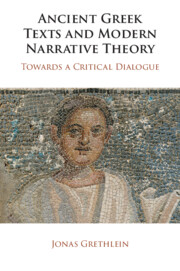Book contents
- Ancient Greek Texts and Modern Narrative Theory
- Ancient Greek Texts and Modern Narrative Theory
- Copyright page
- Contents
- Figures
- Acknowledgements
- Chapter 1 Narratology and Classics
- Chapter 2 Word and World: Fiction(ality)
- Chapter 3 Voice(s): Author/Narrator/Character
- Chapter 4 Minds
- Chapter 5 Motivation
- Chapter 6 Ancient Texts and Postmodern Challenges
- References
- Index Locorum
- General Index
Chapter 4 - Minds
Published online by Cambridge University Press: 11 May 2023
- Ancient Greek Texts and Modern Narrative Theory
- Ancient Greek Texts and Modern Narrative Theory
- Copyright page
- Contents
- Figures
- Acknowledgements
- Chapter 1 Narratology and Classics
- Chapter 2 Word and World: Fiction(ality)
- Chapter 3 Voice(s): Author/Narrator/Character
- Chapter 4 Minds
- Chapter 5 Motivation
- Chapter 6 Ancient Texts and Postmodern Challenges
- References
- Index Locorum
- General Index
Summary
Perhaps the most prominent cognitivist concept in recent narratology is the Theory of Mind. Alan Palmer, Lisa Zunshine and others have been highly influential with their claim that mind reading is at the core of our engagement with narrative in general. However, these scholars have not only ignored how controversial the idea of the Theory of Mind is in psychology – ancient literature, I believe, also belies their argument about narrative at large. Mind reading is certainly central to our responses to modern realist novels, but ancient narratives, as my test case, Heliodorus’ Ethiopica, illustrates, were more invested in the reconfiguration of time than in individualized minds. Plot was crucial for the experiential quality of narrative hailed by critics, as shown in Chapter 2. This prominence of plot is reflected in Aristotle’s Poetics and other critical works. In order not to play off plot against character, I propose experience as a category that integrates cognitive processes as well as matters of plot.
Keywords
- Type
- Chapter
- Information
- Ancient Greek Texts and Modern Narrative TheoryTowards a Critical Dialogue, pp. 81 - 114Publisher: Cambridge University PressPrint publication year: 2023

